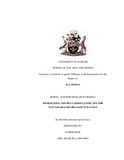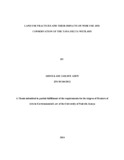Location
Our Vision is to be a world-class university committed to scholarly excellence.
Our Mission is to provide quality university education and training and to embody the aspirations of the Kenyan people and the global community through creation, preservation, integration, transmission and utilization of knowledge.
Core Values
In order to realize the above vision and mission, certain shared values shall be nurtured. There is great need for the University to be guided by the right values derived from the virtues and moral standards of the Kenyan and wider society.
Core Functions
Teaching and Learning: The university offers innovative , relevant and market driven academic programmes , both at undergraduate and postgraduate levels with inbuilt quality control systems the university also provides an environment and policy framework for undertaking high quality and relevant research
Members:
Resources
Displaying 41 - 45 of 298Community perceptions on spatio-temporal land use changes in the Amboseli ecosystem, southern Kenya
Resource changes observed in rangeland ecosystems have triggered a myriad of ecological, social and economic dynamics, often with adverse implications on pastoral livelihoods. This study applied an integrated approach using local knowledge and spatial technologies to assess the long-term changes in pastoral resources and their implications to pastoral livelihoods in the Amboseli ecosystem in southern Kenya. Reduction in grazing land was perceived by the community to be the main change in pastoral resources that has occurred over the 40-year period.
Assessing the Effectiveness of the National Land Commision in Addressing Irregular and Illegal Allocation of Land in Kenya
Irregular and Illegal allocation of land is a major component of the land question is in Kenya.
The land question is a major rhetoric as it is not one issue but a myriad of issues entrenched in
archaic, pre colonial administrative methods and systems which led to lack of transparency and
abuse of high held offices in the self interest of individuals as pertaining to land. The targets for
fulfilling such self interests were public land and land that could not be acknowledged by law for
Redesigning the reclaimed landscape for sustainable recreation in Kayole
In the past mines were abandoned after mining activities leaving undesired effects on the landscape and water sources. Numerous accidents occur in quarries across Kenya leading to deaths of 30 people annually. Mining is an activity presenting a plethora of environmental, social and economic problems thus using abandoned quarries as sites for new construction is a useful form of reclamation, one that has occurred throughout history.
Land cover dynamics in the Chyulu watershed ecosystem, Makueni-Kajiado counties, Kenya
The aim of the study was to assess the state of land cover dynamics in the Chyulu Hills watershed ecosystem of Makueni and
Kajiado Counties in Kenya by considering the following objectives:- a) assessing the state of land cover in 2015, b) analysing
and characterizing land cover transformations in the watershed in 1987, 2001 and 2015, and, c) comparing the forest cover
dynamics with those of other studies in Kenya. The forest cover change analysis was undertaken through remote sensing and
Land Use Practices And Their Impacts On Wise Use And Conservation Of The Tana Delta Wetland
Globally, wetlands are under serious threat from the continuous reclamation due to demand to
satisfy human development needs. Wetlands are the worlds’ most productive environment and
rich in biological diversity of plants and animals. Wetlands provide many ecosystem services to
humans and the environment ranging from fresh water, food, regulation of climate, coastal
protection, regulation of floods, tourism and recreational activities, and water purification.
Despite the mounting recognition of the need to protect wetlands, many continue to be





